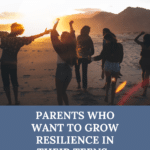
Inside: Our instinct as parents is to protect our kids, but developing resilience in teens and pre-teens can help your child succeed later in life.
This past year my son tried out for travel basketball and was placed on the B team. It stung.
You see, not only was he on the bubble of making it, but his best buddy made the A team. No more traveling to away games together or sharing hotel rooms for tournaments.
And if I’m being honest, this was tough to watch and endure as a parent. We don’t want our kids to struggle or feel hurt, but we know that they need these types of experiences to help learn how to practice resilience during hardships.
It’s important to build resilience in teens and pre-teens to help get them through these challenging years
Resilience is the ability to bounce back — of rising above adversity, learning from challenges, and knowing you can get through a challenging time.
And life is full of setbacks, and we want our kids to know how to cope and believe that they can survive the negative emotions they may be feeling about themselves and whatever situation they are experiencing.
Whether it’s not making a team, managing friendship drama, or struggling in math, life isn’t always glitter and rainbows. Today’s world is full of chaos, and young people face a steady stream of stress that can create a wide range of anxieties.
So, I knew in my heart that watching him go through this would be good for him in the long run, no matter how hard it was on me.
Building resilience is an important life skill.
So far, he’s shown up on the basketball court. He’s been a dependable leader on the B team. He hasn’t missed a game or practice and always wants to arrive early.
He builds up his teammates. He’s risen to the occasion, and I couldn’t be happier that he’s shown a little grit—because I know that the coach of the other team is watching.
And I know the hard work he’s put in this year on the B team, might just earn him a spot on the A team. But if it doesn’t, he now knows, it’ll all be okay. He can survive disappointment and make the best out of a tough situation.
Of course, resilience doesn’t always take the form of a sports team. Sometimes we need to let our children suffer the consequences of their own decisions, like not meeting a deadline or following through on a school project. We may have to let them suffer a bad grade or consequence even if it has a negative outcome on their lives. We have to believe the lesson learned and the resiliency built is worth any short-term missteps.
But, our kids may endure more emotional hardships like divorce, bullying, or physical injury or illness. In this instance, resiliency can make the difference in getting through a tough time.
How do we help our pre-teens and teens learn resiliency?
Here are ten strategies to help your big kid turn into a resilient adult
Model a Positive Attitude.
When life happens (because it will), helping your child have a positive attitude is vital. Yes, they should be allowed to have all of their emotions and sit in their pain (because that’s important, too), but they don’t deserve to stay there. So, when your child sees you modeling a positive attitude after an unfortunate situation, they’ll understand how.
Be Honest
We don’t need to sugarcoat our kids’ experiences for them, especially tweens and teens. To build resilience, our tweens and teens need to understand their roles in a situation and how they can do things differently next time.
Additionally, the older our kids get, the more they appreciate our honesty too. By putting it all out there, our kids will be able to navigate through the tough times easier because there’s no muddiness to trudge through.
Encourage them to Take Risks
Healthy risks are a vital part of growing up—and growing as a human. Sure, your kid may audition for the big school play and earn a minor role instead of the lead, but in the end, they went for it. Eventually, they’ll grow to understand that disappointments are just a part of life and that there’s always next time.
The same goes for physical challenges as well. Let them try sports and activities that challenge them mentally and physically, and you may be surprised at what they can achieve.
Help them Establish a Routine
When it comes to goal setting, setting up a routine is a must. Whether it’s coming home from school every day and working on math or practicing the piano, kids should learn what kind of routines work best for them to attain their goal.
Talk to them about writing down goals to hold themselves more accountable and action steps to help reach them. If they know that they have done everything possible to achieve the desired outcome, it’s easier for them to move on.
Try Mantras
Be prepared. You might get some eye-rolling with this one, but trust me, positive mantras work. Try brainstorming some self-speak with your older child and get them to repeat it daily. (Try these 30 Positive Affirmations For Your Teen To Help Their Confidence and Mental Health.)
Another way to start is to buy some affirmation cards or write little notes to your kid. You can put them in their room, in their book bag, or if they have a phone, even text them. Try whatever works, but positive self-talk works because it rewires your brain to simply believe in yourself.
Deepen Your Connection
When a child knows they have a sturdy parent to lean on, they’re more likely to soar. So, by simply spending more time with your tween or teen doing something they love, they’ll understand that you will always be there to help cushion a fall. And more importantly, you’ll be there to help them stand on their own two feet again. (Not sure where to start? Or does your pre-teen/teen say “I Don’t Know” when you ask what they want to do? Here’s a great list of connection resources to get you started.)
Listen and Help Problem Solve
Create a plan with your big kid when problems arise—don’t fix them. When you help your kid come up with their own plan by listening, they’ll feel empowered and know that they’ll be strong enough to solve their own problems on their own.
This means you need to believe in your parenting. Once you get to a certain age, your job becomes more to guide your child instead of do the work for them. Know that you have set a great foundation for your child in the early years, and now you need to let them see how to put that knowledge to work for them.
Model Mindfulness
Unfortunate circumstances lead to uneasy emotions. So, as adults, it’s important to try to lean into mindfulness practices. I’m guilty of failing at this one often, but when I remember to practice deep breathing or go for a walk outside, I’m immediately calmer. So, if your tween or teen sees you trying to stay calm—and actually do it—they’ll learn to appreciate the benefits, too.
Give Grace
Growing up is hard. Being a messy human making messy mistakes is hard. So, it’s vital that we model giving grace to our teens and ourselves. We’re going to fail, flounder, say something stupid, and more—so own up to our mishaps, and then move on.
Teach Self-Care to Your Teen/Tween
Tweens and teens today are under more stress than ever before, and many do not know how to take care of their health and wellness. When our teens are stressed, burnt out, and overscheduled, we often are more irritable, tired, and susceptible to mental health challenges, such as anxiety and depression. Older kids in particular, may struggle with this one because they want to eat all of the junk food and sleep as little as physically possible. Not great choices.
So, while it feels like we may constantly nag them about topics like this, it’s important they know how to take care of their bodies so that their bodies actually feel good. When we feel good, we can be more resilient in any situation.
Are you in the thick of raising your tweens and teens? You may like this book by Whitney Fleming, the owner of Parenting Teens & Tweens: Loving Hard When They’re Hard to Love: Essays about Raising Teens in Today’s Complex, Chaotic World.

*This post contains affiliate links where we may earn commissions for items purchased from links on our site.







Leave a Comment